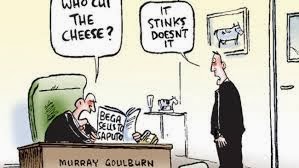Vanguard February 2014 p. 1
Bill F.
The federal budget is due to be released by Treasurer Joe Hockey in May this year. It promises to be a blueprint for savage austerity measures and increased attacks on the livelihood of the working people.
Prime Minister Tony Abbott and his motley crew have out-sourced the job
of drawing up targets for harsh austerity cuts and anti-worker legislation to
their mates in the Business Council of Australia (BCA).
The BCA should more properly be known as the “Big Business” Council of
Australia, since it is comprised of the 100 biggest companies in this country,
many of them foreign corporate monopolies or companies with large foreign
share-holdings. It represents the most powerful and influential core of
monopoly capitalism in Australia
No surprise therefore, that Abbott has appointed Tony Shepherd, straight
from his role as president of the “Big Business” Council, to head up his
Commission of Audit which will examine all government spending and services and
suggest/order where the axes will fall and what will be out-sourced or
privatised. “All items are on the table” said Shepherd when asked about
extending the rate and scope of the Goods and Services Tax.
Just to be sure that no detail is missed and no section of the working
people escapes unharmed, the Executive Officer for the Commission of Audit will
be Peter Crone, Chief Economist for the “Big Business” Council.
In addition to the Commission of Audit, the Productivity Commission has been tasked with a whole series of reviews into such things as pension rates and benefits, grants and concessions, taxes, industrial laws and union governance, child care, the motor vehicle industry as well as existing legislation that protects the natural environment and preserves national parks and conservation areas.
On the chopping block
Government spokespeople and public service bureaucrats have already
leaked a few selective items, partly because they cannot contain their joy at
the opportunity to belt the working class into submission, but also to test the
water and work out how far they can go before all hell breaks loose.
Also on their list…
Postage stamps and rates and delivery frequency – as a prelude to full
privatisation of Australia Post
Privatisation of Medibank Private
Privatisation of SBS
$6 “co-payment” to visit the doctor – and then get rid of bulk-billing
altogether
National education curriculum and education funding
Parasite health funds
Just two days before Christmas, the government announced increases in
the premiums for the private health funds ranging from 6-8%, almost triple the
official level of inflation. Over the past 15 years, average private health fund premiums have risen
by 130%, while average prices have gone up by less than 50%.
For example, Medibank Private which
posted $232.7 million profit last financial year, easily topping the $126.6
million it made in the previous year, has been granted a 6.5% lift in customer
premiums.
Talk about fattening the cow for
market! Now it’s fattening the cow for privatisation! That can only mean
further increases down the track, while public health services are being run
down and starved for funds.
Open slather for big business
While hacking into anything that
benefits the people, the government has been smoothing the way for the
corporate monopolies and big business to boost their profit-making. Hand-outs
to the mining industry amount to $4.5 billion a year according to the Australia
Institute, and pay for the roads, fuel, ports and railways that cart away our
mineral wealth.
Not only are the carbon tax and mining
tax going, going, gone, but so too are many regulations and limitations on foreign
investments and environmental approvals, sneeringly referred to as “red tape”
and “green tape”.
Perks such as ‘profit shifting’ to
off-shore tax havens and negative gearing on investment properties will
continue for the rich and better-off, but there will be no such relief for
ordinary workers.
No choice but struggle
Waiting for a Labor government is no
good. Working people will have to make a stand. They will have to find ways to
get conversations going in their workplaces and communities, to get people
organised to protest and to put demands on the government and the big business
bosses. Demands not just to “back off” but to “get out of our way”. In fact,
all hell should break loose!

















